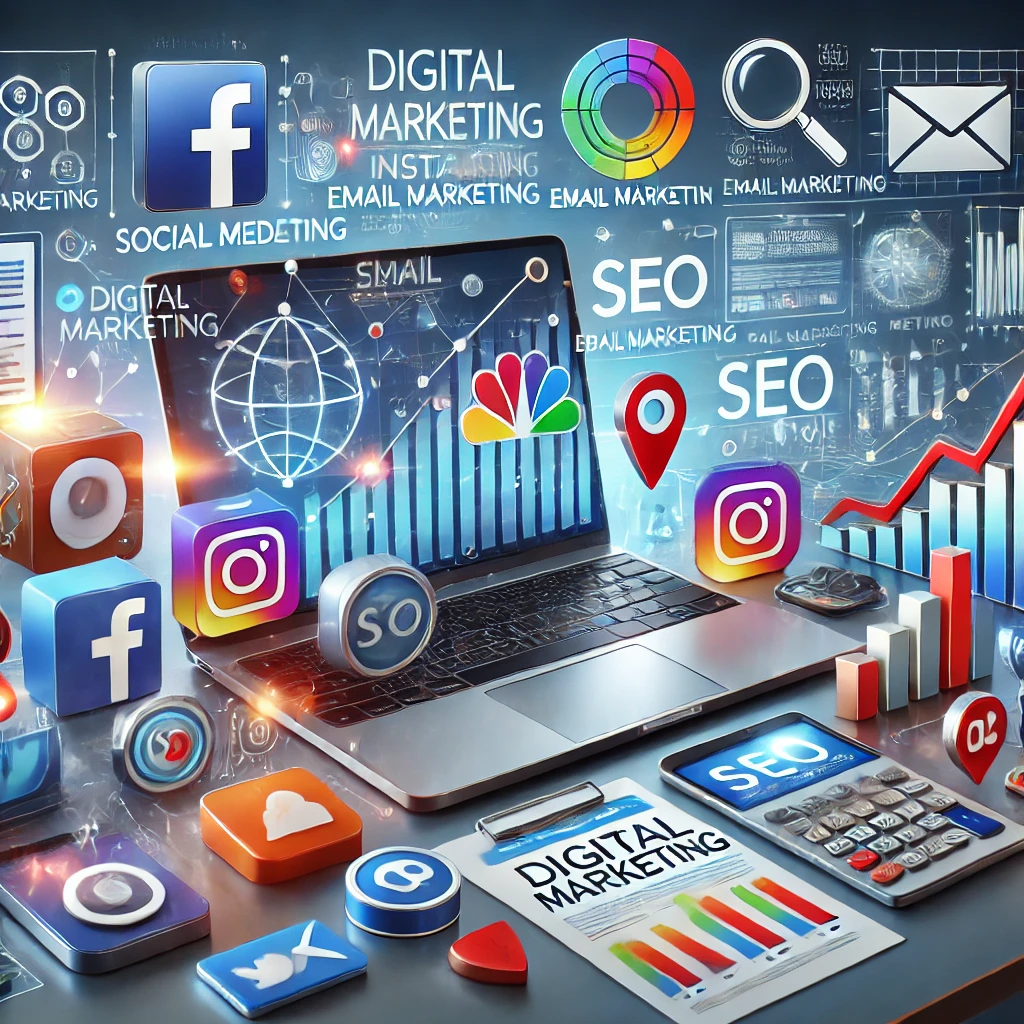In today’s digital age, businesses must adapt to the ever-changing landscape of online platforms and consumer behaviors. Digital marketing has become the backbone of modern business strategies, offering companies of all sizes an opportunity to reach their target audience in innovative and cost-effective ways. If you haven’t yet embraced digital marketing, now is the time to harness its full potential. This article will explore how digital marketing can transform your business and provide actionable strategies to help you succeed.
What is Digital Marketing?
Digital marketing refers to the use of digital channels, such as social media, search engines, email, websites, and mobile apps, to promote products and services. Unlike traditional marketing, which often relies on print media, TV, or radio, digital marketing leverages the power of the internet to reach consumers directly where they spend most of their time: online.
Why is Digital Marketing Important?
- Reach a Larger Audience: With billions of people using the internet, digital marketing offers businesses the opportunity to reach a global audience. Whether you are targeting local customers or looking to expand internationally, digital marketing allows you to connect with potential clients wherever they are
- Cost-Effective: Traditional marketing methods like TV ads, billboards, and print media can be expensive, especially for small businesses. Digital marketing, on the other hand, offers more affordable options, including pay-per-click (PPC) advertising, social media campaigns, and email marketing, which are often more accessible to businesses with smaller budgets.
- Trackable Results: One of the biggest advantages of digital marketing is the ability to track performance in real time. With tools like Google Analytics, you can measure the success of your campaigns, understand consumer behavior, and make data-driven decisions to improve your marketing strategies.
- Engagement and Personalization: Digital marketing allows for personalized communication with your audience. Whether through targeted email campaigns, personalized social media ads, or content that resonates with specific customer needs, you can create meaningful interactions that foster loyalty and increase conversions
Key Digital Marketing Strategies
Now that we’ve highlighted the importance of digital marketing, let’s explore some of the most effective strategies that can help transform your business.
1. Search Engine Optimization (SEO)
SEO is the process of optimizing your website and content so that it ranks higher on search engine results pages (SERPs). By improving your website’s visibility, you can drive organic traffic to your site, ensuring that your business appears in front of people who are actively searching for your products or services.
To implement effective SEO:
Build quality backlinks from reputable websites to boost domain authority.
Focus on keyword research to understand the terms your audience is searching for.
Optimize on-page elements like titles, meta descriptions, and images.
2. Social Media Marketing
With billions of active users across platforms like Facebook, Instagram, Twitter, and LinkedIn, social media marketing allows you to connect with your target audience in a more informal and engaging manner. Regularly posting valuable content, interacting with followers, and running paid ads can boost brand awareness and drive traffic to your website.
To maximize your social media impact:
- Identify the platforms where your audience is most active.
- Post a mix of content, including promotional posts, educational articles, and behind-the-scenes glimpses of your business.
- Use analytics to understand what works best and refine your strategy accordingly.
3. Email Marketing
Email marketing remains one of the most effective forms of digital marketing, providing businesses with direct access to their customers’ inboxes. With personalized email campaigns, you can nurture relationships, offer promotions, and keep your audience engaged.
Key tips for effective email marketing:
- Build a quality email list by offering value through incentives like free resources or discounts.
- Segment your audience based on demographics and behavior for more personalized messaging.
- Use eye-catching subject lines, and ensure your emails are mobile-friendly.
4. Content Marketing
Content marketing involves creating valuable and relevant content to attract and engage your target audience. Whether through blog posts, videos, infographics, or podcasts, content marketing helps position your business as an authority in your industry, driving traffic and encouraging conversions.
Effective content marketing strategies:
- Focus on providing educational content that answers your audience’s questions and solves their problems.
- Use a mix of content types to keep your audience engaged, including blog posts, how-to guides, and case studies.
- Incorporate SEO best practices into your content to ensure it ranks well on search engines.
5. Pay-Per-Click (PPC) Advertising
PPC advertising, including Google Ads, allows businesses to bid on keywords and display ads that appear when users search for specific terms. This form of advertising is highly targeted and cost-efficient, as you only pay when someone clicks on your ad.
Tips for PPC success:
- Conduct thorough keyword research to identify high-converting keywords.
- Optimize landing pages to improve the conversion rate of clicks.
- Set a budget and monitor performance to ensure a positive ROI.
Measuring Success in Digital Marketing
As you implement digital marketing strategies, it’s essential to track and measure their performance. Here are some key metrics to monitor:
- Website traffic: Track the number of visitors to your website and where they are coming from.
- Conversion rate: Measure how many visitors take the desired action, such as making a purchase or filling out a contact form.
- Click-through rate (CTR): Monitor the percentage of people who click on your ads or links.
- Engagement rate: Keep track of likes, comments, shares, and overall interaction with your content on social media platforms.
Conclusion
Digital marketing has the power to transform your business by expanding your reach, improving customer engagement, and providing measurable results. By implementing strategies such as SEO, social media marketing, email marketing, content creation, and PPC advertising, you can grow your online presence and increase revenue.
At UpperNext, we specialize in optimizing digital marketing strategies for businesses of all sizes. Whether you are just starting out or looking to scale your efforts, our team is ready to help you strategize and dominate the digital space. Let us help you navigate the complexities of digital marketing and take your business to the next level!
How Digital Marketing Can Transform Your Business: Strategies for Success


